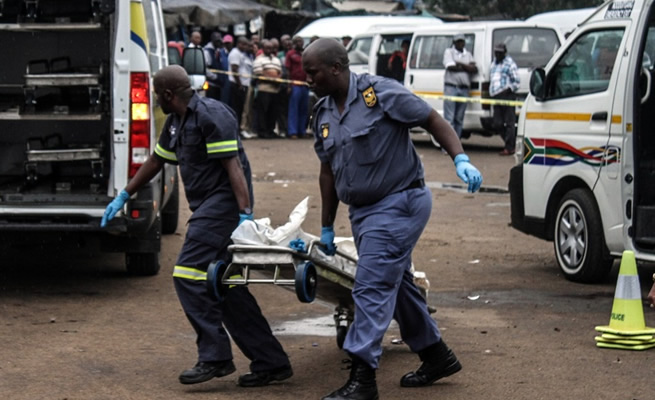A Cape Town taxi boss was brutally gunned down in a hail of bullets on Friday, 31 January, in what eyewitnesses described as a lightning-fast and chilling attack.
The Fatal Attack
The taxi boss, whose identity has not yet been disclosed, was at a local garage checking on one of his vehicles when two unknown assailants opened fire. Eyewitnesses reported hearing about 10 gunshots in rapid succession, with the entire attack lasting less than a second.
“We were spray painting our car when we heard several gunshots. I froze, I couldn’t even run because this was happening like 20 meters away from where I was standing. It took less than one second. The killers had done their job and ran away,” said one of the workers at the garage.
The victim, a 56-year-old man who owned several taxis and a long-distance bus, was pronounced dead at the scene by medical personnel. He sustained multiple gunshot wounds to his body.
Eyewitness Accounts
Residents and workers at the garage described the scene as chaotic and terrifying. “We went to the scene after the shooting and found the taxi owner on the ground. He has several taxis and a long-distance bus. We were shocked by how he died,” said a resident who witnessed the aftermath of the shooting.
The mechanic who was working on the taxi at the time of the attack was unharmed, but the incident has left the community on edge. Police have yet to make any arrests, and the motive for the attack is believed to be taxi-related.
Police Confirm Details
Sergeant Wesley Twigg, a police spokesman, confirmed the incident and appealed to the public for information. “Nyanga police registered a murder case for investigation following a shooting in Govan Mbeki Road, Brown’s Farm, where a 56-year-old man was shot and fatally wounded. According to reports, the victim went to enquire about his minibus taxi when he came under attack from two unknown suspects who shot him,” said Twigg.
He added, “The victim sustained gunshot wounds to his body and was declared deceased on the scene by medical personnel. The motive for the attack is believed to be taxi-related. The suspects fled the scene and are yet to be arrested. Anyone with any information about this shooting incident can contact CrimeStop on 08600 10111.”
A Pattern of Violence
The killing is the latest in a series of violent incidents linked to the taxi industry, which has long been plagued by turf wars, intimidation, and extortion. Just a few weeks ago, police seized over 20 guns at the Nyanga Taxi Rank following a shooting that left one person dead.
The Broader Crisis in Public Transport
The violence in the taxi industry is symptomatic of a deeper crisis in South Africa’s public transport sector. According to political analyst William Gumede, the lack of rule of law has allowed organised mafias to violently take over public and private sectors of the economy.
“Once these groups grasp control of an economic sector, they turn it into an informal sector, pushing out the formal businesses — and with it the former suppliers to these businesses, the supporting infrastructure, the industry safety standards, the investment and employment,” Gumede wrote in a recent article.
He added that the informalisation of the economy reduces state revenue and undermines economic growth, job creation, and poverty reduction.
Taxi Mafias and Their Grip on Power
Taxi associations have been accused of capturing public transport routes, policies, and infrastructure, leading to the informalisation and deindustrialisation of South Africa’s public transport system. These groups often operate with impunity, thanks to their alleged collusion with corrupt politicians, public servants, and law enforcement officials.
“The taxi mafias have been accused of violence, intimidation, attempts at price-fixing and colluding with corrupt politicians, public servants and regulators to destroy large parts of the long-distance bus transport sector,” Gumede noted.
Between January 2021 and February 2022, more than 150 incidents of shooting, stoning, and other acts of violence directed at long-distance bus drivers and passengers were reported to police in the Eastern Cape, Western Cape, and Gauteng.
A Call for Action
The killing of the Cape Town taxi boss underscores the urgent need for the state to intervene and restore the rule of law in the public transport sector. Without decisive action, the violence and lawlessness that have come to define the taxi industry will continue to undermine economic growth, public safety, and social stability.
As Gumede aptly put it, “Unless the minibus taxi industry is brought to heel, South Africa will have no formal bus or rail services.”











